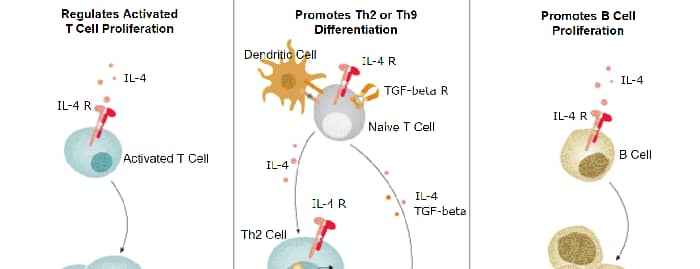Cotton Rat IL-4 Antibody Summary
Cys21-Phe147
Accession # AAL18820
Applications
Please Note: Optimal dilutions should be determined by each laboratory for each application. General Protocols are available in the Technical Information section on our website.
Scientific Data
 View Larger
View Larger
Cell Proliferation Induced by IL‑4 and Neutralization by Cotton Rat IL‑4 Antibody. Recombinant Cotton Rat IL-4 (Catalog # 584-R4) stimulates proliferation in the rat splenocytes in a dose-dependent manner (orange line). Proliferation elicited by Recombinant Cotton Rat IL-4 (10 ng/mL) is neutral-ized (green line) by increasing concentrations of Goat Anti-Cotton Rat IL-4 Antigen Affinity-purified Poly-clonal Antibody (Catalog # AF584). The ND50 is typically 0.075-0.3 µg/mL in the presence of PHA (10 µg/mL).
Preparation and Storage
- 12 months from date of receipt, -20 to -70 °C as supplied.
- 1 month, 2 to 8 °C under sterile conditions after reconstitution.
- 6 months, -20 to -70 °C under sterile conditions after reconstitution.
Background: IL-4
Interleukin-4 (IL-4), also known as B cell-stimulatory factor-1, is a monomeric, approximately 13 kDa‑18 kDa Th2 cytokine that shows pleiotropic effects during immune responses (1‑3). It is a glycosylated polypeptide that contains three intrachain disulfide bridges and adopts a bundled four alpha -helix structure (4). Cotton rat IL-4 is synthesized with a 24 amino acid (aa) signal sequence. Mature cotton rat IL-4 shares 41%, 44%, 57%, and 68% aa sequence identity with bovine, human, mouse, and rat IL-4, respectively. IL-4 exerts its effects through two receptor complexes (5, 6). The type I receptor, which is expressed on hematopoietic cells, is a heterodimer of the ligand binding IL-4 R alpha and the common gamma chain (a shared subunit of the receptors for IL-2, -7, -9, -15, and -21). The type II receptor on nonhematopoietic cells consists of IL-4 R alpha and IL-13 R alpha 1. The type II receptor also transduces IL-13 mediated signals. IL-4 is primarily expressed by Th2-biased CD4+ T cells, mast cells, basophils, and eosinophils (1, 2). It promotes cell proliferation, survival, and immunoglobulin class switch to IgE in B cells, acquisition of the Th2 phenotype by naïve CD4+ T cells, priming and chemotaxis of mast cells, eosinophils, and basophils, and the proliferation and activation of epithelial cells (7‑10). IL-4 plays a dominant role in the development of allergic inflammation and asthma (9, 11).
- Benczik, M. and S.L. Gaffen (2004) Immunol. Invest. 33:109.
- Chomarat, P. and J. Banchereau (1998) Int. Rev. Immunol. 17:1.
- Accession # AAL18820.
- Redfield, C. et al. (1991) Biochemistry 30:11029.
- Mueller, T.D. et al. (2002) Biochim. Biophys. Acta 1592:237.
- Nelms, K. et al. (1999) Annu. Rev. Immunol. 17:701.
- Paludan, S.R. (1998) Scand. J. Immunol. 48:459.
- Corthay, A. (2006) Scand. J. Immunol. 64:93.
- Ryan, J.J. et al. (2007) Crit. Rev. Immunol. 27:15.
- Grone, A. (2002) Vet. Immunol. Immunopathol. 88:1.
- Rosenberg, H.F. et al. (2007) J. Allergy Clin. Immunol. 119:1303.
Product Datasheets
FAQs
No product specific FAQs exist for this product, however you may
View all Antibody FAQsReviews for Cotton Rat IL-4 Antibody
There are currently no reviews for this product. Be the first to review Cotton Rat IL-4 Antibody and earn rewards!
Have you used Cotton Rat IL-4 Antibody?
Submit a review and receive an Amazon gift card.
$25/€18/£15/$25CAN/¥75 Yuan/¥2500 Yen for a review with an image
$10/€7/£6/$10 CAD/¥70 Yuan/¥1110 Yen for a review without an image







